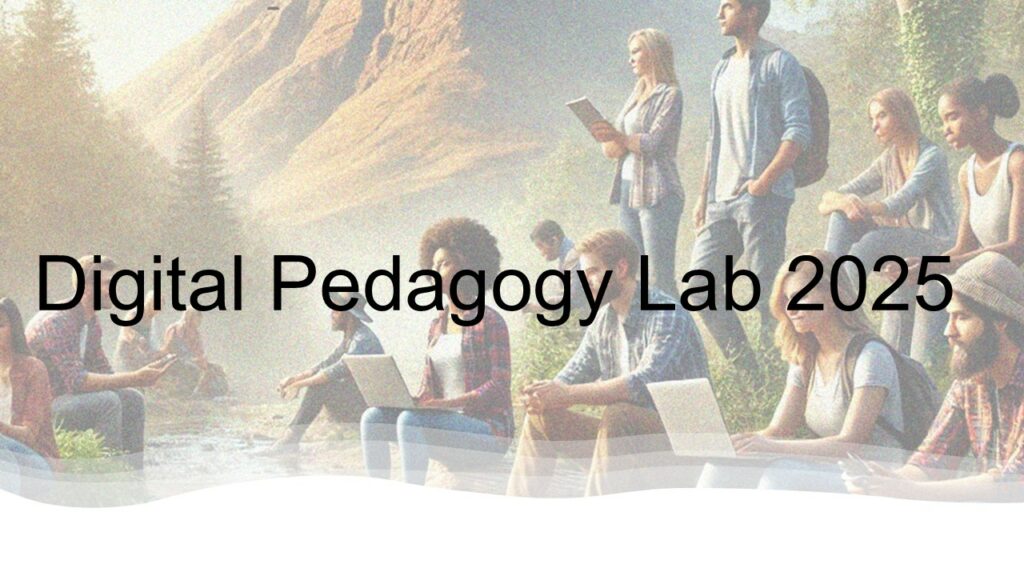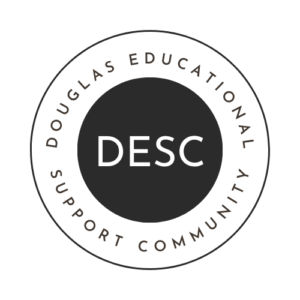
A few reflections from the Digital Pedagogy Lab 2025, February 18-20, 2025 at
Kwantlen Polytechnic University – Richmond Campus
“I teach because education is an act of care, a practice of tending to life (educare). Teaching is more than knowledge transmission; it is an invitation for students to recognize their own power, engage with the world, and, as Sophie Strand puts it, “make good soil” despite all obstacles.”
(A response to the prompt “Why Do I Teach?”
At the Digital Pedagogy Lab, educators examined the intersections of pedagogy, care, equity, and technology. Across sessions, themes emerged around trust, adaptability, and student agency—reaffirming the urgency of teaching with intention.
Keynotes and full conference presentations and workshops
The Evolution of the Digital Pedagogy Lab: From Crisis to Community
Since its inception in 2015, the Digital Pedagogy Lab has continually evolved—responding to crises such as travel bans, the COVID-19 pandemic, and the rise of AI. Rather than remaining static, it has shifted from a traditional conference to a space centered on community and collaboration. This evolution mirrors meaningful pedagogy: fluid, responsive, and deeply human.
Keynote Speaker – Day One
Dr. Jesse Stommel – Pedagogies of Care

Dr. Jesse Stommel is a faculty member in the writing program at the University of Denver. He is also co-founder of Hybrid Pedagogy: The Journal of Critical Digital Pedagogy and Digital Pedagogy Lab. He has a PhD from the University of Colorado. Boulder. He is author of Undoing the Grade: Why We Grade, and How to Stop and co-author of An Urgency of Teachers: the Work of Critical Digital Pedagogy.
Jesse is a documentary filmmaker and teaches courses about pedagogy, film, digital studies, and composition. Jesse experiments relentlessly with learning interfaces, both digital and analog, and his research focuses on higher education pedagogy, critical digital pedagogy, and assessment. He’s got a rascal pup, Emily, a clever cat, Loki, and a badass daughter, Hazel. He’s online at jessestommel.com and on Twitter @Jessifer.
Keynote Speaker – Day Two
Dr. Surita Jhangianai

Dr. Surita Jhangiani is an associate professor of teaching in the faculty of education at the University of British Columbia, and interim associate dean, equity. Dr. Jhangiani is also the David Lam Chair in multicultural education. As holder of this chair, she aims to leverage open pedagogical principles to advance critical multicultural education. Surita is also an advocate of OER, and the recipient of two Open Educational Resource Champion awards from the University of British Columbia. Dr. Jhangiani is currently involved in projects related to open pedagogy, alternative grading, and belonging as it relates to learning and teaching.
Gesturing Towards Decolonial Futures – Reflective Practice Workshop with
Sk_’ing lúudas Natasha Parrish and Dr. Derek Murray

Sk’ing lúudas Natasha Parrish is Haida, Kyaanuuslii Clan, through her mother and maternal grandmothers and English through three grandparents. While she calls Haida Gwaii home, she was born and raised in lək̓ʷəŋən Territory, in a large and loving family, and is a grateful visitor in the Homelands of lək̓ʷəŋən and W̱SÁNEĆ Peoples. She graduated from the University of Victoria with a bachelor of arts in history, a postgraduate degree in secondary teaching, and later a master of arts in Indigenous nationhood. She frames her work as an education developer for Indigenization through Haida principles which include reciprocity, respect, interconnectivity, seeking wise council, and balance. Today, she works with the Centre for Excellence in Teaching and Learning (CETL) at Camosun College supporting instructors in indigenizing and decolonizing curriculum and pedagogy.

Dr. Derek Murray (he/him) is an educator and historian of Irish and Southeastern European ancestry who grew up in the Ottawa Valley and now lives with his partner and two kids as an uninvited guest in lək̓ʷəŋən and W̱SÁNEĆ Territories. Derek works as an educational developer at Camosun College where he supports faculty in all areas of teaching and learning including decolonization and Indigenization, active learning, team-based learning, peer observation, and instructional design, and maintains an active portfolio in the scholarship of teaching and learning. He completed his PhD in history and a graduate certificate in learning and teaching in higher education at the University of Victoria and teaches in the history department at Capilano University.
Tool Parade with Dr. Jesse Stommel and Dr. Martha Burtis

Dr. Martha Burtis is the director of the open learning & teaching collaborative at Plymouth State University (PSU). Since 2021, she has spearheaded the development of Design Forward, a community-based faculty development curriculum for the intentional design of teaching and learning. Prior to coming to PSU, she was the founding director of the Digital Knowledge Center, a peer tutoring organization for students working on digital projects and assignments, at the University of Mary Washington (UMW).
She has taught classes in computer science, American studies, and digital studies at UMW and in interdisciplinary studies at PSU. She holds a bachelor of arts in English from Mary Washington College and an master of arts in instructional technology and media from Teachers College, Columbia University.
The conference attendees selected one of three tracks to participate in. I participated in the Reimaging Assessment track for the three days
- Track One: Introduction to Critical Digital Pedagogies – facilitated by Dr. Surita Jhangiani
- Track Two: Reimagining Assessment: Care and Community – facilitated by Dr. Martha Burtis and Dr. Jesse Stommel
- Track Three: Decolonial Futures of Teaching with Technology – facilitated by Sk_’ing lúudas Natasha Parrish and Dr. Derek Murray
Reimagining Assessment: Care and Community
I participated in this track for the three days and here are a few notes and links:
A recurring theme was the deep-rooted culture of suspicion in education—one that fuels a multi-billion-dollar remote proctoring industry and reinforces assessment structures driven more by compliance than curiosity.
Key insights:
- Cheating rates are stable (60-70% since the 1960s), yet 93% of instructors in 2020 believed online cheating had increased—highlighting how fear often shapes educational policy more than reality.
- Trauma-informed teaching recognizes that students facing food insecurity or systemic barriers may struggle in rigid assessment models.
- Alternative assessment models, such as ungrading and contract grading, foster engagement, creativity, and self-reflection rather than punitive compliance.
The Role of AI: Between Promise and Peril
AI in education is not new—it echoes past anxieties around chalkboards, radio lectures, and MOOCs. The Digital Pedagogy Lab urged educators to critically assess AI’s role in learning:
- AI risks amplifying inequities by privileging students with greater digital access and literacy.
- Environmental impact remains a concern, with AI data centers consuming massive resources.
- Indigenous knowledge systems challenge AI’s extractive models by emphasizing relational accountability and consent-based knowledge sharing.
- Resisting profit-driven AI adoption means ensuring educational technology serves students, not corporate interests.
Beyond the Ed Tech Hype: Ethics, Surveillance, and Equity
The global Ed Tech industry, projected to reach $123 billion, is often marketed as increasing efficiency. However, at the Digital Pedagogy Lab, educators questioned:
- Who profits from student data? Many platforms collect and monetize user data without transparency.
- Do digital tools empower or surveil learners? AI-driven proctoring disproportionately targets marginalized students.
- How can technology support equity? Open-source platforms like WordPress, Zotero, and Hypothesis offer alternatives to corporate-controlled learning environments.
Rethinking Grading: From Surveillance to Student Growth
A few insights:
- Cheating rates are stable (60-70% since the 1960s), yet 93% of instructors in 2020 believed online cheating had increased—highlighting how fear often shapes educational policy more than reality.
- Trauma-informed teaching recognizes that students facing food insecurity or systemic barriers may struggle in rigid assessment models.
- Alternative assessment models, such as ungrading and contract grading, foster engagement, creativity, and self-reflection rather than punitive compliance.
Traditional grading systems reinforce competition, stress, and inequity. Alternative grading strategies discussed included:
- Minimal grading (e.g., pass/fail) to shift focus from grades to feedback.
- Contract grading, allowing students to choose their engagement level.
- Authentic assessments, such as community projects and student-led colloquiums, which emphasize real-world learning over memorization.
- Self-assessment and reflection, reducing bias and fostering intrinsic motivation.
Supporting First-Generation Students
First-generation students often approach college transactionally, seeing grades as survival rather than learning. To support them:
- Explicitly teach the hidden curriculum (e.g., office hours, flexible deadlines, feedback importance).
- Normalize process over perfection by encouraging revision and iterative learning.
- Foster trust through relationships and accessible learning environments.
Key takeaways
We had “Intertrack Sharing sessions” – facilitated by the BCcampus team at the end of each day to learn from others that were in different tracks.
A Call to Action: Reclaiming Education
The Digital Pedagogy Lab ended with a powerful reminder:
“Teaching should respect and care for students’ souls.” — bell hooks
At a crossroads in education, we must ask: Will AI, Ed Tech corporations, and monetary gain dictate learning? Or will we reclaim education as a space for critical consciousness, community, and justice? The future of teaching depends on our commitment to care, trust, and student agency.
Because at the end of the day, education is not just about what students learn—it is about who they become.
Links from the Reimagining Assessment track
A class is a process, an independent organism with its own goals and dynamics. It is always something more than even the most imaginative lesson plan can predict. ~ Thomas P. Kasulis, “Questioning”
Jesse Stommel (Twitter: @Jessifer), Faculty in the Writing Program at University of Denver and Executive Director, Hybrid Pedagogy: the journal of critical digital pedagogy
Pedagogies of Care (slides)
OCR-Enabled PDF of Pedagogies of Care Slides
Start by Trusting Students: Pedagogies of Care in the Age of Artificial Intelligence (slides)
Ungrading and Alternative Assessment
Ungrading Slides: Ungrading for Equity (OCR-Enabled PDF)
Ungrading Notes: Ungrading: an Introduction
Book: Undoing the Grade: Why We Grade and How to Stop
Designing for Care Slides: Pedagogies of Care
OCR-Enabled PDF of Pedagogies of Care Slides
Twitter thread with a collection of my writing and interviews about ungrading.

Leave a Reply